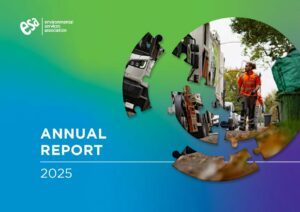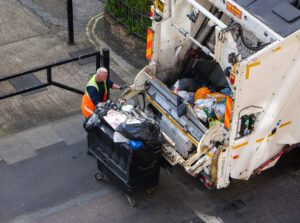A panel of industry experts have described the foundations of the emerging Extended Producer Responsibility regime for packaging (pEPR) as strong, but were critical of the “hidden” costs and complexity of the scheme’s administration during a discussion at ESS Expo this week.
Speaking on the Packaging and EPR Stage at the ESS Expo at the NEC on Thursday (18th September), panellists participating in the “Navigating the pEPR landscape” session said that there had been “teething issues” and described the introduction of pEPR as a “white water ride”.
Paul Vanston, CEO of the Industry Council for Packaging and the Environment IINCPEN), said that there were elements of pEPR administration that should change to improve the process and, ideally, without having to go through a lengthy process of legislative change in Parliament. He said: “Producers are on more of a white-water ride than pleasantly kayaking along a slow-moving river. We don’t yet have a system that is intuitive, and everything needs a lot of hard work and thought, so we need to make it just a bit more intuitive than it is now.”
However, Vanston acknowledged the complexity and challenge of setting up the pEPR system for the first time, particular around conducting recycling assessment methodologies (RAM) for a wide variety of packaging formats across billions of items of packaging placed on the market each year.
He said: “The initial assessment has been a major exercise and it’s complicated, which needs to be taken into account. It’s also extremely consequential because whether you get them [RAMs] right or wrong, they will impact on costs. If you’re the person in the company doing these assessments and it’s turned out wrong, it could increase your bill compared with your competitors.”
“In the UK, we have to respect that we have four Governments of different political colours, four regulators, one Pack UK, one Producer Responsibility Organisation (PRO) coming along, we’ve got one Deposit Management Organisation, more than 7,000 large producers and millions of citizens – and we need to join up all of their actions. This is immensely hard work and is going to need a lot of communication and good will.”
Phil Conran OBE, former Chair of the Government’s Advisory Committee on Packaging and consultant at 360 Environmental, said that there have been some problems with the electronic reporting system for producers.
He said: “Teething issues might be slightly underplaying it – it’s more like a number of root canal operations. The process of development has been very poor with little engagement with industry. What you’ve ended up with is a monster that has made life much more difficult than it needed to be. We used to have a good system and for some reason they’ve reinvented the wheel and turned a round one into a square one.”
Conran also expressed concern that the regulatory burden on producers, coupled with new international tariffs, may undermine the competitiveness of smaller producers and put some out of business, and that there was a danger of “losing sight” of what the pEPR regulations were looking to achieve.
Despite expressing concerns around administrative burdens and costs, Vanston said he was confident pEPR would work.
He said: “We’ve designed a brand-new system. If it was a brand-new car, we’ve got the semblance of the car in front of us but it’s got hundreds of moving parts, some of which haven’t been tested. When we turn on the car, it’ll be the first time we know whether it starts or not. I’m confident that when the pERP key is turned, something will come to life. Will it need a few replacement parts? Inevitably.”
Patrick Brighty, Head of Recycling Policy at the Environmental Services Association (ESA) said that there were “solid foundations” to the pEPR regime and felt that progress was being made over the last 18 months.
Asked about the challenges facing end markets for some secondary materials and whether the policy framework could undermine pEPR, Brighty confirmed that there were challenges for plastics markets.
He said: It depends on the material and there are major challenges for plastics. We have a fantastic set of supply-side reforms which, coupled with the Emissions Trading Scheme, will mostly drive plastics out of the residual waste stream but, without a major investment in back-end plastics infrastructure, we may be short of one million tonnes of sorting and 600,000 tonnes of reprocessing capacity for plastics.
Brighty outlined a number of interventions he said were necessary to bolster domestic markets for recycled plastic.
He said: “We need to address the Packaging Recovery Note (PRN) distortion that incentivises export over domestic reprocessing and we also need to look at the Plastic Packaging Tax with a view to escalating the rate and recycled content thresholds. As well as this, we need to look at the regime around imported plastics because, at present, we have an onerous third-party certification system for the recycled content of domestic plastics, whereas imported plastics can be self-certified, creating an un-level playing field. Other countries have much lower energy and labour costs, so are able to out-compete the UK on recycled plastics.
From our members’ perspective, if we address those issues, there is up to £1.5 billion worth of investment on the table in domestic sorting and reprocessing.”




